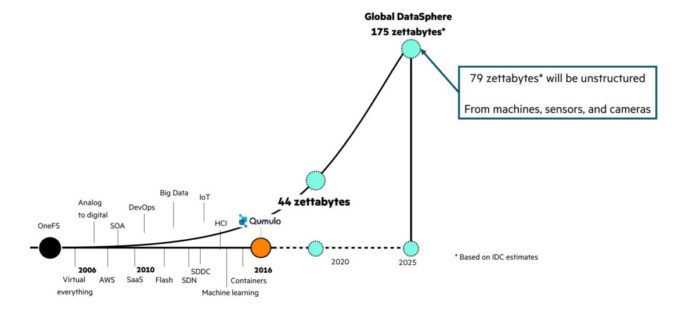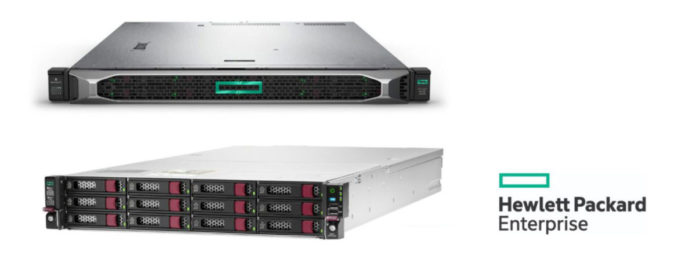Home > News > Media News > Detail

As enterprises undergo digital transformation, they naturally generate a large amount of data, much of which is unstructured data. According to research firm Gartner, unstructured data accounts for 80% to 90% of all new enterprise data, and its growth rate is three times that of structured data. These unstructured data files are small in capacity but incredibly numerous, often reaching storage volumes in the petabytes. The vast majority of this data is crucial to business operations, but effectively managing the massive quantity and achieving high-performance access has become a major challenge for enterprises in managing unstructured data. Systems integration service provider Microware has introduced the Hewlett Packard Enterprise (HPE) paired with Qumulo File Data Platform, which helps enterprises establish a highly scalable storage (Scale Out) architecture to easily cope with the explosive growth of unstructured data.

Unstructured data in the final ZE3000 system comes in many types, most of which are generated by systems or applications but left unmanaged, with the systems unable to proactively analyze them. Examples include system log records, service records, CCTV footage, regulatory data, and massive amounts of Internet of Things (IoT) data. Research firm IDC forecasts that by 2025, the world will generate 79ZB of unstructured data from machines, sensors, and cameras. The explosive growth of this data has become a nightmare for data management.
Microware's Professional Services Assistant Director, Mark Sze, states, "These data are actually in great need of management, as enterprises have the opportunity to utilize them in various projects, and they may even become business opportunities after analysis."

IDC forecasts that by 2025, the world will generate 79ZB of unstructured data from machines, sensors, and cameras. Managing this data is set to become a nightmare for enterprises.
Software-Defined Architecture Safeguards Investment
However, management is always the most challenging aspect, especially for unstructured data, as each file is small in size but the total volume is exceptionally large. If there is a lack of a scalable and high-performance storage architecture to assist with management, the data becomes useless.
Mark added, "Choosing a storage system with insufficient scalability may require replacing the controller. Subsequent use of the data may also lack convenience, potentially requiring additional investment in a new system, ultimately incurring greater costs. Therefore, one should select a storage architecture with both scalability and performance, such as the HPE solution paired with the Qumulo file data platform, which possesses these characteristics. Additionally, Qumulo itself is a software-defined architecture, not limited by the storage medium, and immune to the risk of a particular medium becoming obsolete and requiring a system migration, thereby greatly safeguarding the enterprise's investment."

Across various industries, there is a vast amount of unstructured data that requires the use of a highly efficient and scalable storage system to manage it.
Real-Time Analysis of System Status
The Qumulo file data platform has many outstanding features, with real-time system analysis being its biggest selling point. It allows IT administrators to instantly know the storage status, including throughput, performance, and even usage patterns and data growth sources for different departments. It can also identify the applications and IP addresses that consume the most IOPS and network bandwidth, allowing for proactive deployment planning to determine if the system needs an upgrade.
The platform can also detect problems and provide targeted solutions or self-healing. This is much more practical and reliable than the traditional storage management systems that require hours or even a day to generate reports. Additionally, the platform provides automatic management of NTFS and POSIX permissions, retaining ACLs to enable true collaboration without impacting performance. Qumulo also supports SMB, NFS, and FTP standard protocols, and includes a comprehensive REST API for implementing automated management.
Another area where Qumulo outperforms similar market offerings is 100% storage utilization. For example, if a company purchases 100TB of capacity, the entire 100TB is available for use. In contrast, many storage systems on the market have certain features that become unavailable when capacity usage reaches a certain percentage, effectively requiring the enterprise to purchase additional capacity, and increasing costs.
HPE's solution architecture manager, Eric Chiu, points out that Qumulo's real-time analytics provide IT administrators with instant information, which is crucial for enterprises experiencing rapid, unpredictable data growth. Combined with the Scale Out expansion capability, it can accelerate and simplify storage architecture management to meet business demands. Furthermore, Qumulo is a hybrid-mode platform that fully integrates with public cloud platforms, currently supporting AWS and Google Cloud Platform, allowing for comprehensive management of the hybrid environment through a single interface.

Qumulo provides real-time analytics capabilities, allowing IT administrators to gain instant access to storage information.
Security Safeguards from Software to Hardware
The combination of HPE and the Qumulo file data platform can be considered the most secure data storage system, as both parties have their data security measures, creating a dual layer of protection. Eric mentioned that HPE's hardware equipment is built on the Silicon Root of Trust framework, where certification is obtained from the chip to the operating system (OS), end-to-end.
Meanwhile, Qumulo also has software-based encryption functionality. By integrating Qumulo's security features with HPE's security capabilities, they achieve a high level of security standards, providing the maximum data security safeguards for enterprises.

The HPE ProLiant DL325 series (shown in the image above) is a full NVMe storage system, suitable for applications that require high performance. The HPE Apollo 4000 series (shown in the image below) is a mid-range storage system, suitable for use as an archiving solution.
Choice of Mid-Range to High-End Systems
Currently, HPE mainly has two products that are paired with the Qumulo file data platform - the HPE ProLiant DL325 series and the HPE Apollo 4000 series, to cater to the different needs of enterprises and various applications.
Eric supplemented: "Since the HPE and Qumulo file data platform combination has a high degree of scalability, HPE provides storage capacities starting from 80TB to lower the entry barrier for enterprises. Qumulo can scale up to 1,000 nodes, with practically unlimited capacity, allowing enterprises ample room for expansion."
The HPE ProLiant DL325 is a full NVMe storage system, suitable for applications requiring high performance, such as 4K video production and editing, and real-time data analytics. The HPE Apollo 4000 is a mid-range storage system, suitable for archiving purposes. This solution applies to Hong Kong's healthcare industry (especially gene sequencing), media and advertising production, image security, as well as financial institutions.